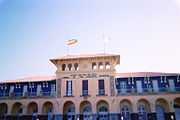Ethio-Djibouti Railways
| Ethio-Djibouti Railways | |||||||||||||||||||||||||||||||||||||||||||||||||||||||||||||||||||||||||||||||||||||||||||||||||||||||||||||||||||||||||||||||||||||||||||||||||||||||||||||||||||||||||||||||||||||||||||||||||||||||||||||||||||||||||||||||||||||||
|---|---|---|---|---|---|---|---|---|---|---|---|---|---|---|---|---|---|---|---|---|---|---|---|---|---|---|---|---|---|---|---|---|---|---|---|---|---|---|---|---|---|---|---|---|---|---|---|---|---|---|---|---|---|---|---|---|---|---|---|---|---|---|---|---|---|---|---|---|---|---|---|---|---|---|---|---|---|---|---|---|---|---|---|---|---|---|---|---|---|---|---|---|---|---|---|---|---|---|---|---|---|---|---|---|---|---|---|---|---|---|---|---|---|---|---|---|---|---|---|---|---|---|---|---|---|---|---|---|---|---|---|---|---|---|---|---|---|---|---|---|---|---|---|---|---|---|---|---|---|---|---|---|---|---|---|---|---|---|---|---|---|---|---|---|---|---|---|---|---|---|---|---|---|---|---|---|---|---|---|---|---|---|---|---|---|---|---|---|---|---|---|---|---|---|---|---|---|---|---|---|---|---|---|---|---|---|---|---|---|---|---|---|---|---|---|---|---|---|---|---|---|---|---|---|---|---|---|---|---|---|---|
Legend
| |||||||||||||||||||||||||||||||||||||||||||||||||||||||||||||||||||||||||||||||||||||||||||||||||||||||||||||||||||||||||||||||||||||||||||||||||||||||||||||||||||||||||||||||||||||||||||||||||||||||||||||||||||||||||||||||||||||||
Ethio-Djibouti Railways (French: Compagnie du Chemin de Fer Djibouto-Éthiopien[1]), also known as the Ethio-Djibouti Railway Enterprise, is a railway company based in the Horn of Africa. It is the successor of the Franco-Ethiopian Railway and is jointly owned by the governments of Ethiopia and Djibouti. The firm was established after Djibouti gained independence in 1977 and received the French ownership stake in the former Franco-Ethiopian line. The railway links Addis Ababa, the capital of landlocked Ethiopia, to the Port of Djibouti in Djibouti City. Maintenance shops along the line are located in Dire Dawa, which grew up as the Imperial Ethiopian Railway depot for nearby Harar.
The railroad is currently being rebuilt and electrified by Chinese and Turkish companies. It is scheduled to be completed by September 2015 and will be 756 km in length. The new railroad is expected to reduce the travel time from Addis Ababa to Djibouti City by half to less than ten hours with a designated speed of 120 km/hour.[2]
Overview

The single track 781 km railway has a 1,000 mm (3 ft 3 3⁄8 in) gauge, most of it on Ethiopian territory, and about 100 km in Djibouti.[3] The company is headquartered in Addis Ababa; the ministers of the Djiboutian Ministry of Equipment and Transport and the Ethiopian Ministry of Transportation and Communications are the president and vice-president of the company.
As of 2009, there reportedly had been no passenger service between Dire Dawa and Addis Ababa for the past two years.[4] The service from Djibouti to Dire Dawa ceased in August 2010.[4]

Ethio-Djibouti Railways has annually run a deficit and is in need of rehabilitation.[5] The European Commission prepared a grant of EUR 40 million in 2003 and raised it to EUR 50 million in 2006. On November 29, 2006, an agreement was signed with the Italian consortium Consta, and work began in 2007 on sections of the line that deteriorated following the Ogaden War.[6]
A change in management is anticipated, which is expected to raise the capacity of the railroad from its current average of 240,000 tons to 1.5 million tons.[7] Initially in 2006, the South African firm Comazar was chosen to receive a 25-year concession. However, this plan was not executed, and in early 2008, it was announced that the railway was in negotiations with the Kuwaiti company Fouad Alghanim and Sons Group.[8] The Ethiopian government announced that it had spoken with the visiting Indian Minister of State for External Affairs, Shashi Tharoor, during his visit on 29 January 2010, about funding to improve the cargo capacity of the rail track from 14 to 17 tons, which would boost the national trade volume significantly.[9]
Addis Ababa railway station
The Addis Ababa railway terminal, La Gare, is a century-old historical building. In 2008 a street project threatened to lead to its isolation or demolition.[10]
Standards
- Couplers : Alliance
- Brakes : Air ; in 1935 some freight wagons not fitted [11]
See also
References
Notes
- ↑ Crozet, Jean-Pierre. Françoise Faulkner-Trine, trans. The Franco-Ethiopian and Djibouto-Ethiopian Railway. 2013. Accessed 12 Feb 2014.
- ↑ Ethiosports, Track laying commences on section of Ethio-Djibouti Railway project, Published By Markos Berhanu On Sunday, May 11th 2014 Under, http://www.ethiosports.com/2014/05/11/track-laying-commences-on-section-of-ethio-djibouti-railway-project/
- ↑ CIA Factbook
- ↑ 4.0 4.1 "Train travel in Ethiopia & Djibouti". Seat61. 4 May 2012. Retrieved 1 July 2012.
- ↑ Annual deficit, accessed 06-12-2008
- ↑ "Ethio-Djibouti Railway rehabilitation accord signed" Walta Information Center
- ↑ South African firm wins bid to administer Ethio-Djibouti railway Hiiran Online
- ↑ "No concession at Ethio-Djibouti Railway" Railway Gazette International September 2007
- ↑ "Ethiopia asks India’s support to improve railways with Djibouti", Sudan Times, 3 February 2010 (accessed 16 April 2010)
- ↑ "Historic Addis Ababa railway station under threat" addis-ababa.wantedinafrica.com May 28, 2008 news regarding La Gare, accessed November 11, 2013.
- ↑ http://nzetc.victoria.ac.nz/tm/scholarly/tei-Gov11_03Rail-t1-body-d9.html
Further reading
- Robinson, Neil (2009). World Rail Atlas and Historical Summary. Volume 7: North, East and Central Africa. Barnsley, UK: World Rail Atlas Ltd. ISBN 978-954-92184-3-5.
- Hugues Fontaine: Un Train en Afrique. African Train. Centre Français des Études Éthiopiennes / Shama Books. Édition bilingue français / anglais. Traduction : Yves-Marie Stranger. Postface : Jean-Christophe Belliard. Avec des photographies de Matthieu Germain Lambert et Pierre Javelot. Addis Abeba, 2012, ISBN 978–99944–867–1–7. English and French.
External links
 Media related to Rail transport in Ethiopia at Wikimedia Commons
Media related to Rail transport in Ethiopia at Wikimedia Commons Media related to Rail transport in Djibouti at Wikimedia Commons
Media related to Rail transport in Djibouti at Wikimedia Commons
| ||||||||||||||